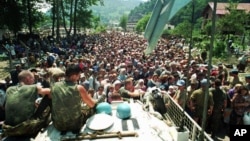A Dutch appeals court ruled Tuesday that the government was partially liable in the deaths of more than 300 Muslim men killed by Bosnian Serb forces in the 1995 Srebrenica massacre.
The ruling formally struck down a civil court's landmark 2014 judgment that said the state was liable in the deaths of the Bosnian Muslim men and boys who were turned over by Dutch U.N. peacekeepers to Bosnian Serb forces in July 1995 and subsequently killed.
But the appeals panel largely upheld the earlier case's findings while significantly cutting the amount of damages relatives of the dead could receive by assessing the victims' chances of survival had they remained in the care of the Dutch troops.
The court estimated the chances of Muslim males' survival if they had stayed in the Dutch compound at around 30 percent.
“The state is therefore liable for 30 percent of the losses suffered by the relatives,” the court said in a statement. The 2014 judgment didn't include that qualification.
In a written reaction, the Dutch Defense Ministry said the government would carefully study the latest ruling.
“The starting point is that the Bosnian Serbs were responsible,” the statement said.
The appeals judgment is the latest in a string of legal cases in the Netherlands concerning the country's role in the Srebrenica massacre and whether the country's soldiers could or should have done more to prevent the mass killings.
Hague Appeals Court presiding judge Gepke Dulek said the men were killed after being removed by Dutch U.N. peacekeepers from their compound during a mass evacuation. Bosnian Serb forces led by Gen. Ratko Mladic had overrun the U.N.-declared safe haven in eastern Bosnia.
“By having the men leave the compound unreservedly, they were deprived of a chance of survival,” presiding judge Gepke Dulek said.
The men were among around 8,000 Muslim men and boys killed by Bosnian Serb forces in Srebrenica in Europe's worst massacre since World War II.
The ruling angered a group of female relatives of victims of the massacre who were in court for the ruling.
Munira Subasic, who leads an organization called the Mothers of Srebrenica that brought the case, stood up and waved her finger at the judge after the ruling, saying “this is a huge injustice.”
Lawyers for the victims can now begin discussions with government lawyers about compensation.
Lawyer Marco Gerritsen, who represented the relatives, said he understood the relatives' anger. “But from a legal point of view it is not that bad. Of course we would have hoped for more and I think we had a good case,” he said.
Gerritsen called the court's assessment of the men's survival chances “very arbitrary.” He said he will study the judgment to see if it is possible to appeal to the Dutch Supreme Court.
On July 13, 1995, Dutch peacekeepers bowed to pressure from Bosnian Serb forces commanded by Mladic and forced thousands of Muslims out of their fenced-off compound, where they had sought refuge.
The Bosnian Serb forces sorted the Muslims by gender, then trucked the males away and began killing them in what would become the bloody climax to the 1992-95 Bosnian war, a slaughter that international courts have ruled was genocide. The war claimed 100,000 lives in all.
The Srebrenica bodies were plowed into hastily made mass graves, which were later bulldozed and scattered among other burial sites in an attempt to hide the evidence.
Mladic is on trial for genocide and other offenses at a U.N. tribunal in The Hague for his alleged role in the Srebrenica massacre and other crimes during the war.




